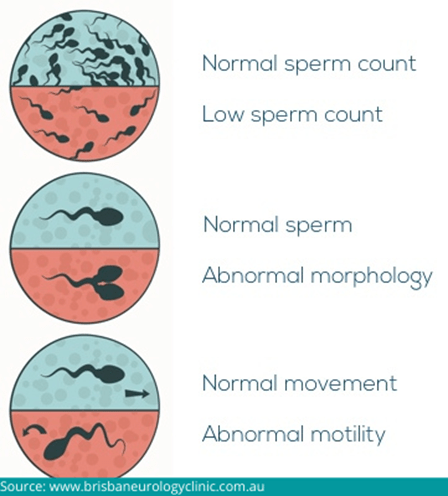Nearly 1 in every 7 couples is infertile, meaning they have not been able to conceive despite having had unprotected sexual intercourse frequent for a year or more. Male infertility does play a partial role in up to 50% of these couples.
Low sperm count, poor sperm function, or obstructions can all contribute to male infertility. Male infertility can also be caused by injuries, lifestyle choices, illnesses, persistent health problems, and other factors.
Dr. Hrishikesh Pai, one of the best IVF doctors in India, says that inability to have a child can be frustrating and disappointing, but there are several treatments for male infertility
What are the symptoms of male infertility?
The inability to conceive a baby is the most common symptom of male infertility. There could be no other visible symptoms or indicators.
However, in other situations, signs and symptoms are caused by an underlying problem such as:
- hormonal imbalance
- an inherited ailment
- dilated veins around your testicles or a condition that prevents sperm from passing through
You may notice the following signs and symptoms:
- sexual function problems, such as difficulty in ejaculating or ejaculating little amounts of fluid, decreased sexual desire, or erectile dysfunction (problems sustaining an erection)
- pain, lump, or swelling in your testicular area.
- respiratory illnesses that recur
- inability to smell
- gynecomastia (abnormal breast development)
- reduced growth of hair on your face or body, or other signs of hormonal or chromosomal abnormalities
The acclaimed fertility specialist in Mumbai, Dr. Hrishikesh Pai, suggests that you also check if you have azoospermia or a low sperm count.
Azoospermia means there is no sperm in your semen, and a low sperm count is when there is less than 15 million sperm per milliliter of semen or your total sperm count is less than 39 million in 1 ejaculation.
What can cause male fertility?
Male fertility can be a tricky business. To make your partner pregnant, you must do the following:

- You have to produce healthy sperm. This begins with the development and growth of your reproductive organs during puberty. You must have at least 1 fully functioning testicle, and your body should generate testosterone and other hormones required to prompt and maintain your sperm production.
- Your sperm must be transported into the semen. When sperm are produced in your testicles, they travel through delicate tubes until they reach and combine with your semen. They get ejected from your penis during ejaculation.
- There must be sufficient sperm in your semen. If your sperm count is low, the chances of 1 of your sperm penetrating and fertilizing your partner’s egg are slim.
- Your sperm must be active and functioning. If your sperm motility (movement) or function is faulty, it may be unable to reach or access your partner’s egg.
Besides low sperm or poor functioning of your reproductive organs, male infertility can also be caused by medical reasons and lifestyle choices.
Medical reasons include:
Varicocele:
A varicocele is an enlargement of the veins that drain the testis and may cause irregular blood flow. Varicoceles cause sperm quantity and quality to be lowered. It is the most common cause of infertility in males and can be reversed.
Infection:
Some illnesses can affect sperm production or sperm health or induce scarring that prevents sperm from passing through. Infections can include epididymitis (swelling of the epididymis) or orchitis (swollen testicles). Sexually transmitted diseases, such as gonorrhea or HIV can also cause infertility.
Some infections can cause irreversible testicular damage; however, sperm retrieval is still possible and frequently performed by Dr. Hrishikesh Pai in Bloom Clinic, a state-of-the-art IVF center in Mumbai.
Ejaculation problems:
In some individuals, the semen enters the bladder instead of exiting out the tip of the penis during the climax, resulting in retrograde ejaculation. Diabetes, medications, spinal injuries, and bladder, prostate, or urethra surgery are health issues that might cause retrograde ejaculation.
Attack by antibodies:
Anti-sperm antibodies are your immune system cells that may mistake sperm as hazardous invaders and try to destroy them.
Tumor:
Male reproductive organs can be affected directly by cancers and nonmalignant tumors or indirectly through glands that release hormones associated with reproduction, like the pituitary gland. Male fertility can be affected by surgery, radiation, or chemotherapy used to treat malignancies.
Undescended testicles:
If 1 or both of your testicles failed to descend from your abdomen into the scrotum (the sac that typically holds the testicles) during your fetal development, it could lead to infertility.
Defected tubules:
Sperm is carried through many distinct tubes. They can be obstructed for various reasons, including unintentional surgical injury, past infections, trauma, or improper growth, such as in cystic fibrosis or other genetic disorders.
The eminent IVF specialist in Mumbai, Dr. Hrishikesh Pai,adds that a blockage can occur anywhere in the testicle, including the tubes that drain your testicle, the epididymis, the vas deferens, the ejaculatory ducts, and the urethra.
Lifestyle Choices

Drug use:
Anabolic steroids, which increase muscle strength and growth, can shrink your testicles and reduce the production of sperm. Marijuana or cocaine use can temporarily lower the quality and quantity of your sperm.
Alcohol use:
Alcohol use can impair your testosterone levels, cause erectile dysfunction, and lower sperm production. Excessive drinking can induce liver illness, which can affect fertility.
Tobacco consumption:
If you smoke, you may have a decreased sperm count than men who do not. Male fertility may be harmed by secondhand smoke.
Weight:
Obesity can affect male fertility in a variety of ways, including directly affecting sperm or generating hormone changes that lower male fertility.
Dr. Hrishikesh Pai, among the leading IVF specialists in India, says that excessive exposure to heat, pollutants, and chemicals, among other things, can also impair sperm production and function.
Can male infertility be prevented?
Male infertility cannot always be avoided. However, you can strive to prevent some of the most likely reasons for male infertility. For instance:
- Avoid smoking.
- Limit or avoid drinking altogether.
- Avoid using illegal drugs.
- Keep your weight in check.
- Avoid getting a vasectomy.
- Avoid anything that causes the testicles to become too hot, like tight clothing, frequent saunas, working with your laptop on your lap, etc.
- Reduce your anxiety.
- Exposure to pesticides, heavy metals, and toxins should be avoided.
Conclusion

Male infertility can result from a variety of factors. You might not produce enough sperm, or sperm may not be healthy. You could have a hereditary condition or an infection. An obstruction in your genital tract is also a possible cause.
Learning that you are infertile might be a rude awakening.It may cause you immense emotional stress and a feeling of being less masculine. But do not lose hope.
Schedule an appointment with the renowned fertility specialist, Dr. Hrishikesh Pai, at the earliest for a safe and effective treatment.
With over 35 years of expertise in infertility treatments, he is one of the preferred IVF specialists in Mumbai.

